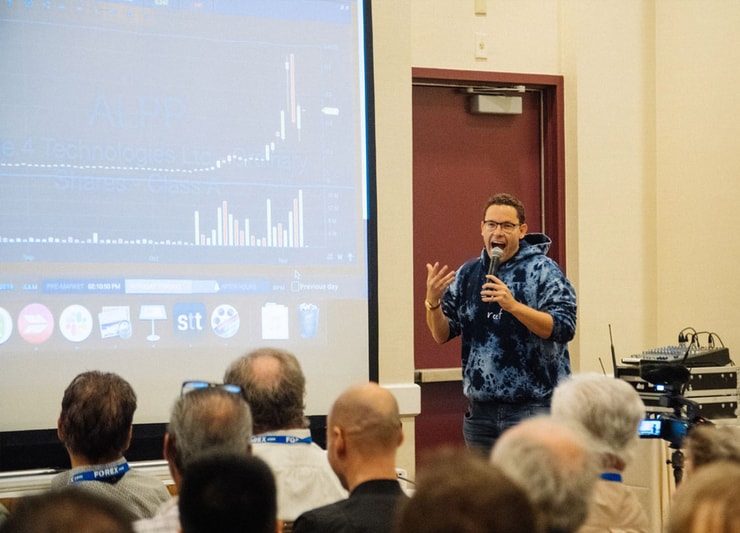One thing that’s been scary about the recent sell off in the market to most traders has been how orderly it’s been.
In many cases we need to see a total flush out before buyers can step back in…
However, that hasn’t been the case.
Meanwhile, we’re entering one of the most volatile periods of the year: earnings season.
Not to mention, uncertainty surrounding interest rates and geopolitical tensions in the Middle East.
In a market like this you’ve got to be extremely careful.
In fact, if you want to give yourself the best chance to succeed, then you must answer these three questions.
Table of Contents
Question #1: Where’s My Risk?

During times of uncertainty and high volatility the emphasis should shift from profit seeking to capital preservation.
So many newbies focus on trying to make money all the time…they forget about the risk.
Yes, we are seeing plenty of short squeezes. But at the same time, none of them are really clean.
That’s why you need to think defensive first.
Finding the hottest plays isn’t hard if you have a tool like the StocksToTrade Breaking News Chat…
However, you can still lose money if you’re not careful.
Are you a trader that likes buying the breakout…or someone like myself who patiently waits for a panic to buy the dip?
Before you get into a trade it’s better to know your outs.
On the profit side I usually aim for 5%-10%. If I don’t see that move right away I will bail.
Other traders will set stop losses based on a specific support or resistance level.
The reason why having an out is so important is because it’s easier to honor it.
If a trade starts working against you and you don’t have a mental stop in mind…then you’ll likely get emotional…not exit the trade…possibly double down…or not sell because you’re too stubborn to take a loss.
In a fast and volatile market you can’t let emotions interfere with your decision making. Let me correct myself, if you’re going to let any emotion in, it should be fear.
If you trade scared…trading won’t be scary.
Keep things simple and don’t risk more than you can potentially make.
It IS possible to trade safely w/the https://t.co/ZB6EtR1OtK rules & you don't have to risk big losses/stress like too many gamblers believe. Yes, https://t.co/0HhPp6CC1v is a REAL thing, trade scared so trading isn't so scary. More than enough volatility to still make you rich
— Timothy Sykes (@timothysykes) October 23, 2023
Question #2: Do I Know All The Information

Anyone with a high/low ticker can find where the action is.
But that’s not enough.
You need to be an informed trader. Again, that’s where something like the StocksToTrade Breaking News Chat can play such a huge role.
For example, have you looked into the stock’s structure?
Is it a low float or has it already been diluted heavily?
What’s the catalyst moving the stock?
Is the news legit, or are we dealing with a stock that is getting pumped?
Is the stock hard to borrow, are short sellers involved?
Does the stock have a history of making big moves? How does it typically react?
Knowing this stuff in advance, will help you make better decisions in the future.
STUDY CHECK, WHO'S STILL UP STUDYING??? WHO WANTS SUCCESS BAD ENOUGH????
— Timothy Sykes (@timothysykes) October 22, 2023
More Breaking News
- Entegris Faces CFO Transition Amid Price Target Boosts from Analysts
- Morgan Stanley’s Bold Moves Boost Cipher Mining’s Prospects
- BigBear.ai Expands Partnerships and Strengthens Financial Position
- Credo Technology Unveils AI Retimer Amid Strategic Partnerships
Question #3 What’s The Current Sentiment

I’ve said many times…three out of four stocks will follow the market.
Right now, the overall market is down, and most stocks are trending down with it.
However, if you stick to catalyst specific small caps then you can still find stocks that are surging higher.
On the other hand, it’s a lot easier to make money in a bull market. All you have to do is go back to 2020-21 and you’ll see what I mean.
In addition to getting a pulse on the market…you want to know what the latest working trends are.
Right now, it’s been short squeezes.
Furthermore, you want to take note of the price action.
Have we seen stocks make huge gap ups in the pre-market and then fade?
Are the best trades happening in the afternoon?
Is the price action choppy or clean?
Traders tend to have short term memories…they will ride a trend until it stops working.
This is extremely helpful to be up on the latest trends. However, elite traders are also aware of the past.
History tends to repeat itself…if you can study the past and also apply it to the latest trends then you’re super prepared to take on this market.
Repetition is a vital part of mastering trading. Learning to identify the elements of a strong trade and setup is the key.
— StocksToTrade (@StocksToTrade) October 24, 2023
📌 Mastering Market Uncertainty: 3 Questions Every Trader Needs Answered! 📌

Navigating the market’s unpredictable twists isn’t just about finding the next big stock or following the mainstream advice.
It’s about understanding the core principles and being two steps ahead.
🔍 Are you assessing your risks properly?
🔍 Have you done your due diligence on a stock’s background?
🔍 Can you gauge the market’s ever-changing sentiment?
In a market landscape where every tick can result in gains or losses, where volatile periods like the earnings season shake even the experienced traders, the right knowledge and a timely decision make all the difference.
🌪 Don’t get swept away by the chaos.
📊 Don’t just trade… trade smart.
📊 Gain the clarity you need in this topsy-turvy trading world.
🌟 Join our exclusive live training session this week. 🌟
💡 Dive into real-world strategies molded for these unpredictable market times.
💡 Witness real-time chart analysis, revealing the underlying stories of the current market moves.
💡 Empower yourself to anticipate and pivot, rather than react and regret.
The path to informed trading starts with the right questions. Are you asking them?
🚀 Your Blueprint for Trading Success in a Chaotic Market Awaits. 🚀



Leave a reply